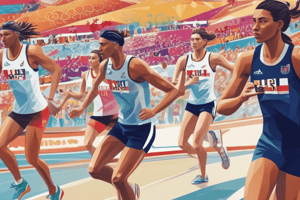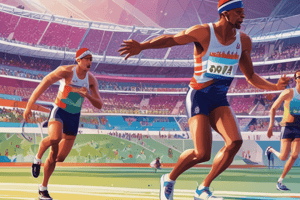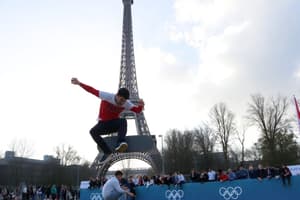Podcast
Questions and Answers
What are the key personality traits of the Olympic Phryge?
What are the key personality traits of the Olympic Phryge?
Modest, sharp-minded, passionate, and fearless.
What is the significance of the running prosthetic worn by the Paralympic Phryge?
What is the significance of the running prosthetic worn by the Paralympic Phryge?
It enables her to run at lightning speed.
How would you describe the Phryge's attitude towards sports and competition?
How would you describe the Phryge's attitude towards sports and competition?
She is always game to play, hates being bored, and loves to try new things.
What values does the Phryge promote through sports?
What values does the Phryge promote through sports?
How would you describe the Phryge's role in sports?
How would you describe the Phryge's role in sports?
What is the symbol of freedom that the Phryges are based on, and what is its significance in French history?
What is the symbol of freedom that the Phryges are based on, and what is its significance in French history?
What is the significance of the Phrygian cap in modern French society?
What is the significance of the Phrygian cap in modern French society?
What historical events have the Phrygian caps been a part of, according to the French National Archives?
What historical events have the Phrygian caps been a part of, according to the French National Archives?
What is the personality of the Olympic Phryge, and how does it relate to Olympic athletes?
What is the personality of the Olympic Phryge, and how does it relate to Olympic athletes?
What is the mission of the Phryges, and what do they aim to show the world?
What is the mission of the Phryges, and what do they aim to show the world?
What is the significance of the Phryges in the context of the Paris 2024 Olympic and Paralympic Games?
What is the significance of the Phryges in the context of the Paris 2024 Olympic and Paralympic Games?
Flashcards are hidden until you start studying
Study Notes
The Phryges
- The Phryges are the mascots for the Paris 2024 Olympic and Paralympic Games, tasked with promoting the role of sport in society.
- They are based on the Phrygian cap, a symbol of freedom and French history, dating back to ancient times.
The Phrygian Cap
- The Phrygian cap has been featured on certain flags in Latin America and became popularized by French revolutionaries.
- It is a symbol of revolution, the French Republic, and freedom.
- The Phrygian cap is depicted on French national icon Marianne, on stamps, and is part of the national curriculum in schools.
The Phrygian Tribe
- The Phrygian cap has been worn during major events in French history, including the construction of Notre-Dame cathedral in 1163, the Revolution of 1789, the building of the Eiffel Tower, and the Paris 1924 Olympic Games.
- Records of Phrygian caps can be found in the French National Archives.
The Olympic Phryge
- The Olympic Phryge is thoughtful, strategic, and modest, preferring to hide her emotions.
- She is likened to Olympic athletes, understanding the importance of measuring parameters to achieve goals.
- She will lead the movement of those who take part in sport and promote France's movement.
The Paralympic Phryge
- The Paralympic Phryge wears a running prosthetic, enabling her to run at high speed.
- She is passionate, fearless, and adventurous, loving to try new things and participate in various sports.
- She is a supportive and celebratory figure, promoting the values of sport and celebrating athletes in all arenas.
Studying That Suits You
Use AI to generate personalized quizzes and flashcards to suit your learning preferences.





